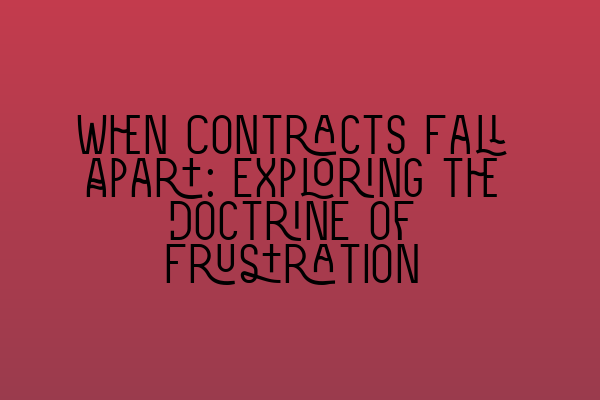When Contracts Fall Apart: Exploring the Doctrine of Frustration
Contracts are the backbone of any business transaction. They provide certainty and security for both parties involved and lay the foundation for a successful working relationship. However, despite the best intentions and efforts, contracts can sometimes fall apart due to unforeseen circumstances. This is where the doctrine of frustration comes into play.
The doctrine of frustration, often referred to as a “contract killer,” is a legal concept that recognizes that certain events may occur which make it impossible for parties to fulfill their contractual obligations. These events are typically beyond the control of the parties and are not caused by any fault or negligence on their part.
Frustration can occur in various situations, such as in the case of a natural disaster, war, or a change in law that renders the contract illegal or impossible to perform. Other examples include the death or incapacity of a key party, the destruction of the subject matter, or the outbreak of a pandemic. When such events happen, they can have far-reaching consequences for the parties involved, and the doctrine of frustration provides a legal remedy.
It is essential to understand that frustration is not a mechanism for escaping a contract whenever it becomes inconvenient or challenging to fulfill. Instead, it is reserved for exceptional circumstances where the contract becomes impossible to perform due to an unforeseen and unforeseeable event. Courts apply a strict standard when determining frustration and carefully consider the facts and circumstances of each case.
The consequences of frustration are significant. When a contract is frustrated, it is automatically terminated, and both parties are released from their future obligations. However, this does not necessarily mean that parties are relieved of their past obligations. Courts will look at the impact of the frustrating event on the performance of the contract and may require one party to compensate the other for expenses incurred before the frustration occurred.
Now, you may wonder how you can apply the doctrine of frustration to your own contracts or protect yourself from its consequences. As a solicitor, I highly recommend seeking legal advice and assistance when dealing with frustrated contracts. A solicitor specializing in contract law can help you analyze the circumstances surrounding the frustration and guide you on the best course of action.
If you are interested in learning more about the legal field or exploring other legal concepts, I invite you to read the following articles that I have written:
– “Mentorship for Aspiring Solicitors: Nurturing Talent in the Legal Field” (link)
– “Legal Challenges and Pitfalls: Navigating the Complexities of the Legal System” (link)
– “Demystifying the Solicitors Qualifying Examination (SQE): What You Need to Know” (link)
– “Mentorship for Aspiring Solicitors: Finding Guidance on Your Legal Journey” (link)
– “Exploring Alternative Dispute Resolution: An Effective Approach to Legal Conflicts” (link)
These articles cover a range of topics that will further enhance your understanding of the legal profession and provide valuable insights into the complexities of the legal system.
In conclusion, the doctrine of frustration serves as a safeguard when contracts become impossible to perform due to unforeseen events beyond the control of the parties. Understanding this concept and seeking professional legal guidance when needed can help you navigate the complexities of contractual relationships and protect your interests. Remember, contracts may fall apart, but with the right knowledge and support, you can mitigate the repercussions and emerge stronger.
